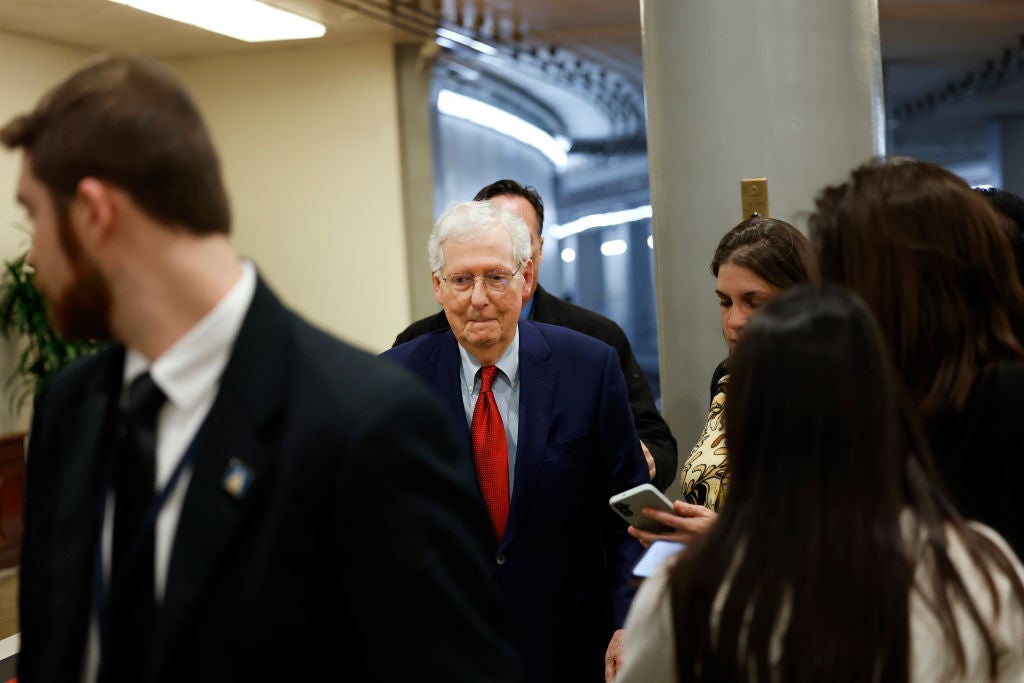On Thursday, Mitch McConnell did what just one year ago would have been unthinkable: He completed a four-step condemnation of Donald Trump, and voted against Robert F. Kennedy Jr. to be the nation’s health secretary.
But it was an almost completely meaningless gesture. McConnell, 82, is going by the same playbook he did during Donald Trump’s first presidency and his ensuing political resurrection — offering token resistance to the man who took over his party while providing political cover for his allies in the GOP Senate caucus.
His vote Thursday followed the publication, a day earlier, of a mildly critical op-ed in a Kentucky newspaper, the Courier Journal, citing “big, lingering concerns for American industry and workers” stemming from Trump’s tariff plans.
McConnell’s decision to vote against the nominations of Pete Hegseth, Tulsi Gabbard, and now Kennedy should be looked at through a dual lens. First, his newfound maverick-y quality serves an obvious purpose: bolstering the image of a fragile but longstanding undercurrent of independence among the Senate GOP, these days most often exemplified by the likes of Susan Collins and Lisa Murkowski.
But second, it serves to give John Thune (one of his close allies and the new Senate majority leader) the political capital and the votes he needs to ram Trump’s nominees through the Senate with minimal defections. McConnell, once the Senate GOP leader, has now voted against Trump more times than any Republican senator in the current Congress — a careful play, not an accident.

McConnell’s vote against RFK Jr’s nomination was the only defection on the GOP side Thursday. And it shouldn’t be mistaken; had more GOP defections emerged, McConnell may well have voted the other way.
Collins, who is up for re-election in 2026 (and must first win a GOP primary) voted in favor, as did Murkowski (up for re-election in 2028, and likely to face a Republican rival too). By lining up behind one of Trump’s most controversial nominees, other Republicans in the chamber who maybe can’t afford a risky vote have their consciences soothed by the knowledge that the president still has received several clear warning shots across his bow.
There’s no reason to think that McConnell will extend this voting pattern to legislation, either. He’s likely to be a strong supporter of two Republican legislative priorities this year — boosting funding for border security, and extending the 2017 Trump tax cuts.
The reason for McConnell to play this role is obvious. Having laid down the mantle of leadership, the former majority leader is falling into the position of supporting the waning center-right faction tied to Senate leadership, though now with the status of a backbencher who can make different political choices, including voting against the majority if need be.
Speculation about his impending retirement (which he has not announced) abounds in the halls of Washington as well as in Kentucky, where potential contenders are already lining up to vie for his seat.
Rumors that this may be his last term, likely to grow louder after multiple spills in the Senate this month, only lend credence to the idea that McConnell is playing the role of fall guy. More than anything else, it’s a position of deliberate weakness: McConnell is choosing to cast votes on the losing side, something he never would have done as Senate leader with a Republican majority in the chamber.
This is no effort to curry favor or protect his reputation among Democrats, two outcomes in which, as a senator from a deep-red state, McConnell has never shown any interest. And it was carefully done in a way that didn’t obstruct Trump’s agenda.
It didn’t spare the former Senate leader from a rebuke, however: On Thursday, Trump told CNN’s Kaitlan Collins in a White House gaggle that McConnell was a “very bitter man” and “not equipped mentally”, a label he said applied to the last 10 years of McConnell’s career.
Meanwhile, it was announced that Elaine Chao, McConnell’s wife, would be among the MAGA allies named to the Kennedy Center as part of the president’s bid to remake one of America’s cultural institutions in his image.
That was a particularly surprising development given that Chao too had as recently as 2023 delivered a scathing rebuke of Trump for a Truth Social post directed at Chao, his former Transportation secretary, which many found to be racist.
If the two have made up, it’s unlikely. It’s far likelier that McConnell is playing the same tune he always has — the loyal soldier — just with a slightly different uniform.

